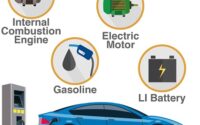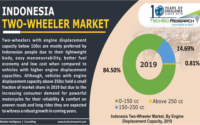Automotive Catalytic Converter Market to Grow at a Brisk CAGR through 2025
Increasing production of vehicles and stringent rules and regulations to control harmful vehicular emissions to drive global automotive catalytic converter market
According to TechSci Research report, “Global Automotive Catalytic Converter Market By Type (Two-way oxidation Catalytic Converter, Three-way oxidation-reduction Catalytic Converter, Four-Way Catalytic Converter, Selective Catalytic Reduction, Diesel oxidation, Lean Nox Trap), By Catalyst (Platinum, Palladium, Rhodium, Others), By Vehicle Type (Passenger Car, Light Commercial Vehicle, Truck, Bus, Off-Highway Vehicle (Agriculture Tractors, Construction Equipment, Mining Equipment)), By Region, Forecast & Opportunities, 2025”, the global market for automotive catalytic converter is expected to grow at a brisk rate during the forecast period on account of increasing production & sales of automobiles and stringent regulations enacted by the government to reduce GHGs. Another factor influencing the market growth is technological advancements in the automotive sector which has led to the development and manufacture of advanced automotive catalytic converters. However, high cost of technology and pulsating prices are likely to hinder the market growth.
Browse XX market data Tables and XX Figures spread through XXX Pages and an in-depth TOC on “Global Automotive Catalytic Converter Market”
https://www.techsciresearch.com/report/automotive-catalytic-converter-market/4729.html
Global automotive catalytic converter market is segmented based on type, catalyst, vehicle type, company and region. The type segment is further divided into two-way oxidation catalytic converter, three-way oxidation-reduction catalytic converter, four-way catalytic converter, selective catalytic reduction, diesel oxidation and lean nox trap. Selective catalytic reduction catalytic converter segment dominated the market in 2019. These are comparatively more environment friendly as they reduce NOx in the emissions and use ammonia as reducing the agent. These factors are the major reason behind the dominance of this segment. The technology has expanded to light commercial vehicles and passenger cars from being limited to only heavy commercial vehicles. This expansion has supplemented the segment growth. On the basis of catalyst, the market is fragmented into platinum, palladium, rhodium and others, out of which, palladium is expected to be the dominant segment until 2025 on account of its cost effectiveness.
Regionally, in 2019, Asia-Pacific held the dominant position in the global automotive catalytic converter market and occupied more than half of the global share. Major reason for the dominance of the region is the presence of countries like China, Japan and India which are the largest vehicle producers. Since these countries are the top vehicle manufacturers, there arises a dire need to control harmful vehicular emissions, therefore the region is expected to hold the largest share in the coming years as well.
Download Sample Report @ https://www.techsciresearch.com/sample-report.aspx?cid=4729
Customers can also request for 10% free customization on this report.
Some of the leading players in global automotive catalytic converter market include Faurecia SA, BASF Catalysts LLC, Eberspaecher GmbH Holding & Co., Magneti Marelli S.P.A, Tenneco Inc., Benteler International AG, Calsonic Kansei Corporation, Standard Motor Products Europe Ltd., Clean Diesel Technologies Inc., BOSAL Group, Futaba Corporation, HJS Emission Technology GmbH & Co. KG, Jetex Exhausts Ltd., Johnson Matthey, Umicore, etc. The companies adopt various strategies like product launches or mergers in order to expand their market reach and create stronghold in the market. For instance, Clean Diesel Technologies launched a catalytic converter in collaboration with AP Exhaust technologies, in the year 2015.
“Global automotive catalytic converter market is anticipated to witness significant growth in as developing economies like India and China in the dominant Asia-Pacific region are formulating strict vehicle emission control standards. The regulations have grown stricter as India and China are now planning to shift to China6 and BS6 in the year 2020 from China4 and BS4. Additionally, these norms are the revised form of previous emission limiting norms and thus, limit the CO, NOx and particulate matter emissions to a greater extent. China6 will be implemented in two parts, China6a in 2020 and China6b in 2023. Moreover, China 6b will be more efficient than China 6a and will limit the emissions of hydrocarbons to 50%, NOx to 40% and PM to 33%.,” said Mr. Karan Chechi, Research Director with TechSci Research, a research based global management consulting firm.
“Global Automotive Catalytic Converter Market By Type (Two-way oxidation Catalytic Converter, Three-way oxidation-reduction Catalytic Converter, Four-Way Catalytic Converter, Selective Catalytic Reduction, Diesel oxidation, Lean Nox Trap), By Catalyst (Platinum, Palladium, Rhodium, Others), By Vehicle Type (Passenger Car, Light Commercial Vehicle, Truck, Bus, Off-Highway Vehicle (Agriculture Tractors, Construction Equipment, Mining Equipment)), By Region, Forecast & Opportunities, 2025”, has evaluated the future growth potential of global automotive catalytic converter market and provided statistics & information on market size, shares, structure and future market growth. The report intends to provide cutting-edge market intelligence and help decision makers take sound investment decisions. Besides, the report also identifies and analyzes the emerging trends along with essential drivers, challenges and opportunities in global automotive catalytic converter market.
Contact
Mr. Ken Mathews
708 Third Avenue,
Manhattan, NY,
New York – 10017
Tel: +1-646-360-1656
Email: [email protected]



